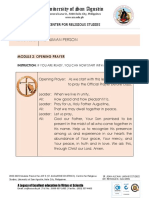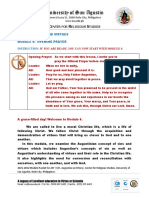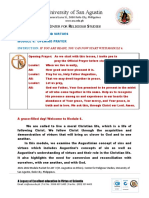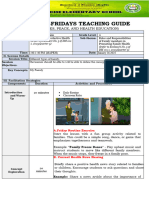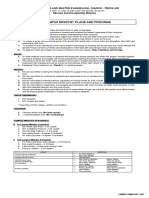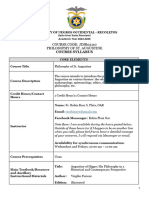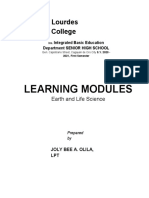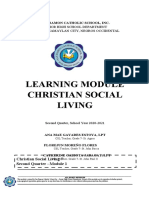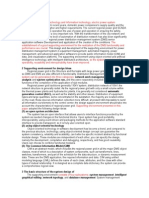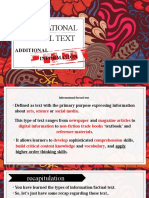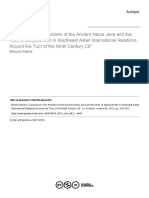Asf 3 Module 8 Mans Ultimate End and Eschatology
Asf 3 Module 8 Mans Ultimate End and Eschatology
Uploaded by
PANDACopyright:
Available Formats
Asf 3 Module 8 Mans Ultimate End and Eschatology
Asf 3 Module 8 Mans Ultimate End and Eschatology
Uploaded by
PANDACopyright
Available Formats
Share this document
Did you find this document useful?
Is this content inappropriate?
Copyright:
Available Formats
Asf 3 Module 8 Mans Ultimate End and Eschatology
Asf 3 Module 8 Mans Ultimate End and Eschatology
Uploaded by
PANDACopyright:
Available Formats
University of San Agustin
General Luna St., 5000 Iloilo City, Philippines
www.usa.edu.ph
CENTER FOR RELIGIOUS STUDIES
MODULE 8: HUMANITY’S ULTIMATE END AND ESCHATOLOGY
MODULE 8: OPENING PRAYER
INSTRUCTION: IF YOU ARE READY, YOU CAN NOW START WITH MODULE 8.
Opening Prayer: As we start with this lesson, I invite you
to pray the Official Prayer before class.
Leader: When we live in unity,
All: How good and how pleasant it is.
Leader: Pray or us, Holy Father Augustine,
All: That we may dwell together in peace.
Leader: Let us pray,
All: God our Father, Your Son promised to be
present in the midst of all who come together in
His name. Help us to recognize His presence
among us and experience in our hearts the
abundance of Your grace, Your mercy, and
Your peace, in truth and in love. We ask this,
through Christ our Lord. Amen.
2022-2023 Module Packet for ASF 3 (ST. AUGUSTINE ON ETHICS). Center for Religious SR. JEAN ALCAIN, LMSH 07/27/2022
Studies, University of San Agustin, Iloilo City, Philippines. DR. REYNOLD B. NAVARES
Email: crs@usa.edu.ph | Tel. No.: 0999-997-1485 | Fax No.: (033) 337-4403
University of San Agustin
General Luna St., 5000 Iloilo City, Philippines
www.usa.edu.ph
CENTER FOR RELIGIOUS STUDIES
A GRACE-FILLED DAY! WELCOME TO MODULE 8.
This module deals with various unavoidable realities of humanity which
includes the understanding of worldwide heading towards the end
which are death and immortality, the resurrection of the body, eternal
happiness, and damnation. It further explores Saint Augustine’s
theological reflection and exploration so as to understand man’s
eschaton.
Consultation hours:
Phone/messenger:
Virtual time:
MODULE 8: LEARNING OBJECTIVES
By the end of Module 8, students will be able to:
1. deepen their understanding about death, the resurrection of the
body, and eternal happiness and damnation;
2. demonstrate how to help them live each moment of their lives
according to the plan of God;
3. pray for the guidance of the Holy Spirit as they live a life
according to the will of God.
2022-2023 Module Packet for ASF 3 (ST. AUGUSTINE ON ETHICS). Center for Religious SR. JEAN ALCAIN, LMSH 07/27/2022
Studies, University of San Agustin, Iloilo City, Philippines. DR. REYNOLD B. NAVARES
Email: crs@usa.edu.ph | Tel. No.: 0999-997-1485 | Fax No.: (033) 337-4403
University of San Agustin
General Luna St., 5000 Iloilo City, Philippines
www.usa.edu.ph
CENTER FOR RELIGIOUS STUDIES
MODULE 8: COURSE CONTENTS
Below is the Schedule for Module 8.
TIME TO
ACTIVITY DESCRIPTION OVERVIEW
COMPLETE
Opening Prayer 2 minutes
Learning Objectives 2 minutes
1 Peer Sharing Synchronous
Topic 1 - USING THE WORLD WHILE
2A 15 minutes
HEADING TOWARDS THE END
2B Topic 2: DEATH AND IMMORTALITY 15 minutes
Topic 3: RESURRECTION OF THE
2C 15 minutes
BODY
Topic 4 - ETERNAL HAPPINESS AND
2D 15 minutes
ETERNAL DAMNATION
ASSESSMENT TASK 1: Road Map Life
30 minutes
Journey
ASSESSMENT TASK 2: Quiz 10 minutes
Conclusion 3 minutes
Closing Prayer 2 minutes
References
2022-2023 Module Packet for ASF 3 (ST. AUGUSTINE ON ETHICS). Center for Religious SR. JEAN ALCAIN, LMSH 07/27/2022
Studies, University of San Agustin, Iloilo City, Philippines. DR. REYNOLD B. NAVARES
Email: crs@usa.edu.ph | Tel. No.: 0999-997-1485 | Fax No.: (033) 337-4403
University of San Agustin
General Luna St., 5000 Iloilo City, Philippines
www.usa.edu.ph
CENTER FOR RELIGIOUS STUDIES
MODULE 8. Activity 1 – PEER-SHARING
Follow the instructions below:
● Pair with any of your classmates, then share
the question, how do you prepare & face the
ultimate end?
● Ask one or two pairs to the class, then they
will also post the output in the NEO-LMS
dashboard.
● Total Score = 5 points
SHORT DEEPENING LEADING TO THE LECTURE/DISCUSSION PROPER:
(The teacher can choose any of these options to do lecture/
discussion such as ppt/pdf presentation, pre-recorded lecture,
summary-overview processing, NEO-LMS tools, interactive apps such
as slido, poll everywhere, gamification, etc.)
MODULE 8: Activity 2A – USING THE WORLD WHILE HEADING TOWARDS
THE END (Alvarez & Cabahug, 2021)
Please read the script below.
1) Augustine’s Understanding of Man’s ultimate end
“You have made us for yourself, and our heart is restless until it
rests in you” (Conf. 1.1). This famous Augustinian line presents to us
man’s ultimate end. Man desires eternal rest with God since only then
2022-2023 Module Packet for ASF 3 (ST. AUGUSTINE ON ETHICS). Center for Religious SR. JEAN ALCAIN, LMSH 07/27/2022
Studies, University of San Agustin, Iloilo City, Philippines. DR. REYNOLD B. NAVARES
Email: crs@usa.edu.ph | Tel. No.: 0999-997-1485 | Fax No.: (033) 337-4403
University of San Agustin
General Luna St., 5000 Iloilo City, Philippines
www.usa.edu.ph
CENTER FOR RELIGIOUS STUDIES
will man enjoy true and lasting happiness. It is a state of “Sabbath that
has no evening” (The City of God 22.30).
As man makes its way towards the ultimate end who is God, the
possession of whom alone can give man true and lasting happiness,
man must learn how to live well in the present world. Augustine
distinguishes between “uti” and “frui,” to remind us that the material
things of this world are meant to be only used in view of one’s ultimate
goal (cf. Arendt: 36-37), and not enjoyed in themselves (cf. The City of
God 19.2; also see 11.25; 15.7; 19.1; On Christian Teaching 1.22.20; On
the Lifestyle of the Catholic Church 20.37; On Music 6.14.46).
Enjoyment is clinging to something lovingly for its own sake which
should be reserved for God alone. The rest (including ourselves) fall
under the category of “uti” or means to obtain enjoyment with God
(Canning: 859). Augustine seems to have changed their view as to
whether humans should fall under the category of “uti” and asserted
that one should love people for their own sake as well as for the sake
of God (Kent, 2001).
2) Augustine’s Counsel Regarding the Hindrances of the Ultimate End
Human persons fall into depravity when they regard creatures or
themselves or worldly states or situations as objects of enjoyment and
take God’s graces as mere objects to be used. Augustine also gives
us another understanding of what evil is: “The deed is the evil thing,
not the thing of which the sinner makes an evil use. Evil is making a
bad use of a good thing … worshipped and served the creature
rather than the Creator” (On the Nature of the Good 34).
Evil is an act of injustice against God. Real evil is injustice seen in every
case where a man loves for their own sake things which are desirable
only as means to an end and seeks for the sake of something else
2022-2023 Module Packet for ASF 3 (ST. AUGUSTINE ON ETHICS). Center for Religious SR. JEAN ALCAIN, LMSH 07/27/2022
Studies, University of San Agustin, Iloilo City, Philippines. DR. REYNOLD B. NAVARES
Email: crs@usa.edu.ph | Tel. No.: 0999-997-1485 | Fax No.: (033) 337-4403
University of San Agustin
General Luna St., 5000 Iloilo City, Philippines
www.usa.edu.ph
CENTER FOR RELIGIOUS STUDIES
things which ought to be loved for themselves …. Man is just when one
seeks to use things only for the end for which God appointed them
and to enjoy God as the end of all, while one enjoys the “self” and
friends in God and for God. To love in a friend -the love of God is to
love the friend for God. Both justice and injustice, to be acts at all,
must be voluntary; otherwise, there can be no just rewards or
punishments” (Against Faustus 22.78).
MODULE 7: Activity 2B – DEATH AND IMMORTALITY
Please read the script below.
1) Augustine’s on Immortality
Regarding the question of immortality, Augustine considers it a
prerequisite for true happiness (Kent, 2001). The human body at the
end of time, Augustine says is not “incapable of dying” (The City of
God 13.24).
In the creation account in the book of Genesis, God gave a
possibility that man would have lived forever if man only followed
God’s instruction not to eat the fruit of the “tree of the knowledge of
good and evil” (cf. Gen 2:17). The African bishop distinguishes
between two types of body– an “animal body” and a “spiritual body”
(The City of God 13.24). The former was capable of dying; the other
was not.
Adam also possessed a “body” while in Paradise, but the
Creator called Adam to avoid dying instead. Adam was called to live,
not to die. But sin entered the scene and rendered the primordial
man’s “animal body” now subject to death instead. The “spiritual
body” is that which is incapable of dying and called to immortality “in
virtue of the presence of the life-giving spirit” in it (The City of God
2022-2023 Module Packet for ASF 3 (ST. AUGUSTINE ON ETHICS). Center for Religious SR. JEAN ALCAIN, LMSH 07/27/2022
Studies, University of San Agustin, Iloilo City, Philippines. DR. REYNOLD B. NAVARES
Email: crs@usa.edu.ph | Tel. No.: 0999-997-1485 | Fax No.: (033) 337-4403
University of San Agustin
General Luna St., 5000 Iloilo City, Philippines
www.usa.edu.ph
CENTER FOR RELIGIOUS STUDIES
13.24). The implication of all this is that while the death of our “animal
body” is inevitable, man will still enjoy immortality in virtue of his/her
possession of a “spiritual body.” Man, simply have to allow God to
breathe the life-giving Spirit into man and live according to God’s
standards instead of living in a carnal way or according to the
standards of man (cf. The City of God 14.4). The “animal body” is
identical to the “carnal body” (The City of God 14.4). Those who are
predestined to become citizens of the Heavenly City allow God’s spirit
to guide them while those of the earthly city subject themselves to
death.
The “flesh” should not be identified with the “animal body”
subject to carnal corruptibility. The term can refer to a man. (cf. The
City of God 14.4) or to the original substance or nature created by
God for a man (cf. The City of God 13.24). The Bible does not confine
the application of the term “flesh” to the body of an earthly and
mortal being (cf. The City of God 14.2). Augustine distinguishes
between the “flesh” before man’s Fall and the “flesh” after the Fall (cf.
The City of God 21.8).
Prior to the Fall, the human body would have operated in full
harmony with the human mind and in complete conformity with the
human will (Hunter: 358). Having been created by God as man’s
“natural substance,” the “flesh” is not evil in itself (cf. The City of God
14.5), contrary to what some might think (cf. The City of God 14.2). The
teachings of the Manichee’s identified the human body with evil since
they believed that everything made of the matter was intrinsically evil
(cf. The City of God 14.5). Augustine refuted such teachings and
affirmed that in the end the flesh would survive and be raised back to
life purified of any corruptible element. If ever man or his soul is
weighed down by the corruptible body, the cause of it is not to be
sought in the very substance of one’s body, but in its corruption (cf.
The City of God 14.3).
2022-2023 Module Packet for ASF 3 (ST. AUGUSTINE ON ETHICS). Center for Religious SR. JEAN ALCAIN, LMSH 07/27/2022
Studies, University of San Agustin, Iloilo City, Philippines. DR. REYNOLD B. NAVARES
Email: crs@usa.edu.ph | Tel. No.: 0999-997-1485 | Fax No.: (033) 337-4403
University of San Agustin
General Luna St., 5000 Iloilo City, Philippines
www.usa.edu.ph
CENTER FOR RELIGIOUS STUDIES
Man is currently in a state of pilgrimage in this world where man
is subject to various passions or emotions because of our possession of
an “animal body” (cf. The City of God 14.3; 21.3). The Stoics
considered the body as the source of all such “passions” and they
identified four of them – viz. desire, fear, joy and grief (cf. The City of
God 14.3; 14.5; 21.13). Augustine rejected such teaching saying: “Our
belief is something very different, for the corruption of the body, which
weighs down the soul, is not the cause of the first sin but its punishment.
It was not the corruptible flesh that made the soul sinful; it was the sinful
soul that made the flesh corruptible” (The City of God 14.3; 19.4; Ws.
9:15). The soul is weighed down by the body because of its corruption
which is the consequence of the original sin. If man had not sinned,
then man’s body would not have been corruptible, and it would not
weigh the soul down. The “flesh” would not be corruptible if the soul
had not sinned through improper use of its free will.
2) Augustine’s on Death
Augustine speaks of two types of death – that of the body and
that of the soul. The former takes place when the soul leaves the
earthly body (= separation between body and soul), while the latter
happens when the soul alienates from the life of God and sins (cf. The
City of God 6.12; 13.2; 13.15; 19.28; 20.6).
The first death is temporary and is the common lot of mankind,
while the second death will last for eternity (cf. The City of God 13.8;
13.14). Those rescued by God’s grace will be spared from the second
death. (cf. The City of God 13.23).
The second death is more grievous, “it is the worst of all evils,”
Augustine says (The City of God 13.11). Just as there are two types of
death, there are also two kinds of resurrection – a first and a second
2022-2023 Module Packet for ASF 3 (ST. AUGUSTINE ON ETHICS). Center for Religious SR. JEAN ALCAIN, LMSH 07/27/2022
Studies, University of San Agustin, Iloilo City, Philippines. DR. REYNOLD B. NAVARES
Email: crs@usa.edu.ph | Tel. No.: 0999-997-1485 | Fax No.: (033) 337-4403
University of San Agustin
General Luna St., 5000 Iloilo City, Philippines
www.usa.edu.ph
CENTER FOR RELIGIOUS STUDIES
one. The first is the resurrection of mercy, the other is the resurrection
of judgment” (The City of God 20.6). Corresponding with these two
resurrections are two judgments – the first one takes place at the
moment of a person’s death -a judgment “in the meantime,” while
the second one will take place at the end of the world – called the
“last” or “final” judgment (The City of God 20.1). All men will be
judged based on “the particular actions of individuals performed by
the decision of their will” (The City of God 20.1), whether one resisted
or obeyed the truth or participated or not in the “true religion” (The
City of God 20.3).
MODULE 8. Activity 2C – RESURRECTION OF THE BODY
Please read the script below.
1) Augustine’s on the Resurrection of the Body
The first resurrection is “the resurrection of souls” alone and not
yet of the body (cf. The City of God 20.6). This happens at the moment
of one’s death in this world when the soul departs from the body. Right
there and then the souls will be judged. Today we say that some will
be sent immediately to heaven, while some will be condemned, and
their souls will already experience suffering. Both the souls of the
blessed and of the damned will still have to wait for the second
resurrection – that of their bodies. At the second resurrection, both the
living and the dead will be judged. Those souls which during the first
resurrection, were found blessed, will then be united with their
resurrected bodies- restored to incorruptibility (cf. The City of God
14.10), and enjoy eternal happiness with both their bodies and souls,
while the damned souls will be joined with their bodies and both will
be sent to eternal punishment (cf. The City of God 13.12). For those
who will still be found alive during Judgment Day, Augustine believes
2022-2023 Module Packet for ASF 3 (ST. AUGUSTINE ON ETHICS). Center for Religious SR. JEAN ALCAIN, LMSH 07/27/2022
Studies, University of San Agustin, Iloilo City, Philippines. DR. REYNOLD B. NAVARES
Email: crs@usa.edu.ph | Tel. No.: 0999-997-1485 | Fax No.: (033) 337-4403
University of San Agustin
General Luna St., 5000 Iloilo City, Philippines
www.usa.edu.ph
CENTER FOR RELIGIOUS STUDIES
that they will experience a swift death, like in a blink of an eye in order
to be resurrected along with the rest.
There were many theories in circulation concerning the
resurrection during the early centuries, some of which are explicitly
cited and refuted in “The City of God.” One upholds that the
resurrection involves only the body and not the soul (cf. The City of
God 20.10). One, on the contrary, denies the resurrection of the body
and limits it to the soul (cf. The City of God 22.4). Cicero in particular
says: “Their bodies (sc. of deceased men of the distant past) were not
taken up into heaven; indeed, Nature would not allow what comes
of the earth to dwell anywhere but on the earth” (On the Republic
3.28).
2) Augustine’s Philosophical View of the Body & Soul
The Platonic teaches that all elements that compose the
universe – viz. fire, air, water, and earth – each one with its own weight
must remain in their proper places – “not a particle of earth can exist
in heaven” (cf. The City of God 22.11). Thus-the souls of men after
death eventually return to the body either that of men or that of
beasts (cf. The City of God 10.30).
Plato and Plotinus espoused this theory while Porphyry (disciple
of Plotinus) refused to believe that the human soul could return to the
body of an animal and even entertained the idea that the soul may
not have to return to the body at all once it had been completely
purified of all evils (cf. The City of God 10.30).
Augustine preferred Porphyry’s theory to that of the thinkers who
imagined a circular movement of souls (cf. The City of God 10.30).
Augustine also rejected the Platonic belief that the soul has always
existed and is coeternal with God (cf. The City of God 10.31). Although
2022-2023 Module Packet for ASF 3 (ST. AUGUSTINE ON ETHICS). Center for Religious SR. JEAN ALCAIN, LMSH 07/27/2022
Studies, University of San Agustin, Iloilo City, Philippines. DR. REYNOLD B. NAVARES
Email: crs@usa.edu.ph | Tel. No.: 0999-997-1485 | Fax No.: (033) 337-4403
University of San Agustin
General Luna St., 5000 Iloilo City, Philippines
www.usa.edu.ph
CENTER FOR RELIGIOUS STUDIES
the African bishop points out the unacceptability of some Platonic
teachings, Augustine does see a possible point of reconciliation
between Plato and Plotinus in this: the former’s belief in the soul’s
return to a body and the latter’s stand that it is possible for the soul to
live forever in felicity without having to return to the evils of the world
(cf. The City of God 22.28). The Christian faith can accept both in the
sense that the soul, indeed, will ultimately be joined to a body – the
“spiritual body” freed from corruptibility – and enjoy unending
happiness deprived of any evil.
The Bishop of Hippo also finds no contradiction in affirming both
the soul’s desire for happiness and its resurrection and the resurrection
of the body and in the idea that “the perfect bliss of the soul comes
only when it has been completely stripped of the body and returns to
God” (The City of God 13.16).
True happiness consists in possession of the Highest Good
(summum bonum), which is the combination of goods both the body
and the soul (cf. The City of God 19.3). It is not the body itself that
weighs down the soul but its corruption (cf. The City of God 14.3). It is
the corruptible body that burdens the soul. It is this type of body that
must inevitably disintegrate and perish and return to the earth upon
man’s death (cf. The City of God 13.17). There is another type of body
that is meant to endure forever – the “spiritual body” (The City of God
13.23), which God will restore to all of us on Judgment Day. Our
“animal body” will then become “spiritual as a reward for obedience”
(The City of God 13.23).
Man derives the “animal body” from Adam. It became
corruptible because of sin, but it can become a “spiritual body”
through Christ (cf. The City of God 13.20; 13.22-23; 1Cor 15:44-49; Van
Fleteren: 333ff.). Once the body has become “spiritual” there will no
longer be any opposition between the desires of the soul and the
2022-2023 Module Packet for ASF 3 (ST. AUGUSTINE ON ETHICS). Center for Religious SR. JEAN ALCAIN, LMSH 07/27/2022
Studies, University of San Agustin, Iloilo City, Philippines. DR. REYNOLD B. NAVARES
Email: crs@usa.edu.ph | Tel. No.: 0999-997-1485 | Fax No.: (033) 337-4403
University of San Agustin
General Luna St., 5000 Iloilo City, Philippines
www.usa.edu.ph
CENTER FOR RELIGIOUS STUDIES
desires of the body and true justice will prevail within man “by which
the soul is subordinated to God and the body to the soul, and both
body and soul are subordinated to God” (The City of God 19.4; 19.27;
cf. 14.19). “Our nature will be healed by immortality and incorruption
and will have no perverted elements” (The City of God 19.27; 20.16-
17).
Man’s flesh will be renewed and made exempt from decay (cf.
The City of God 20.5; 21.8; 22.24; 22.30). Man’s bodies will no longer
have any defects (cf. The City of God 22.17; cf. Ellingsen, 2005) and
will possess perfect beauty (cf. The City of God 22.19; 22.20). “It is not
necessary for the achievement of happiness to avoid every kind of
body, but only bodies which are corruptible, burdensome, and in a
dying state; not such bodies as the goodness of God created for the
first human beings but bodies in the condition which the punishment
for sin forced upon them” (The City of God 13.17). Real happiness
which all men desire – cannot be achieved in the present life (cf. The
City of God 19.4).
MODULE 7. Activity 2D – ETERNAL HAPPINESS AND ETERNAL
DAMNATION
Please read the script below.
1) Augustine’s on Eternal Happiness
Augustine talks about the destiny of the aborted bodies of
babies (cf. The City of God 22.13), of bodies mutilated and devoured
by animals or other men (cf. The City of God 22.20), etc. Augustine
says that “in the resurrection of the body for eternal life, the body will
have the size and dimensions which it had attained or was to attain
2022-2023 Module Packet for ASF 3 (ST. AUGUSTINE ON ETHICS). Center for Religious SR. JEAN ALCAIN, LMSH 07/27/2022
Studies, University of San Agustin, Iloilo City, Philippines. DR. REYNOLD B. NAVARES
Email: crs@usa.edu.ph | Tel. No.: 0999-997-1485 | Fax No.: (033) 337-4403
University of San Agustin
General Luna St., 5000 Iloilo City, Philippines
www.usa.edu.ph
CENTER FOR RELIGIOUS STUDIES
at maturity, according to the design implanted in the body of each
person, with its appropriate beauty preserved also in the proportions
of all the parts” (The City of God 22.20; cf. 22.24 on the idea of the
potency or “the power of seed” implanted in the human body);
“All human beings will rise again with a body of the same size as
they had, or would have had, in the prime of life” (The City of God
22.16), possessing “the stature which one had in its prime” or “the
stature one would have attained” (The City of God 22.15), “that
maturity they would have attained by the slow lapse of time” (The City
of God 22.14). The bodies will retain their respective sexes but will all
be free of the necessity of intercourse and childbirth as the lust of the
present life will disappear (cf. The City of God 22.17). And all will be
fully satisfied notwithstanding the difference in merits, “just as in the
body the finger does not wish to be the eye” (The City of God 22.30).
2) Augustine’s on Eternal Damnation
As to question of the suffering of the damned- some denied that
the body will also be subject to eternal pain with its corresponding
soul. They would readily admit the possibility of punishment only for
one or the other in this world but not for both. Also, of eternal suffering
of the soul and not of the body. Augustine’s position is very clear in this
regard. Augustine upholds the teaching of the Catholic Church
affirming the eternal suffering of both body and soul after Judgment
Day. The two will be joined again at the end of time (cf. The City of
God 21.3). In the present world, pains of the flesh are really paining of
the soul, experienced in the flesh. It feels no pain apart from the soul
(cf. The City of God 14.15; 21.3).
This will not be the case in the future. The punishment of the
wicked will be both by “fire and worm” – that is, “the fire to the body
in the literal sense, and the worm to the soul in the metaphorical
2022-2023 Module Packet for ASF 3 (ST. AUGUSTINE ON ETHICS). Center for Religious SR. JEAN ALCAIN, LMSH 07/27/2022
Studies, University of San Agustin, Iloilo City, Philippines. DR. REYNOLD B. NAVARES
Email: crs@usa.edu.ph | Tel. No.: 0999-997-1485 | Fax No.: (033) 337-4403
University of San Agustin
General Luna St., 5000 Iloilo City, Philippines
www.usa.edu.ph
CENTER FOR RELIGIOUS STUDIES
sense” (The City of God 20.22; 21.9; Mt 9:42ff.). The African bishop is
convinced that the human body is capable of avoiding disintegration
by death and even persisting in fire (cf. The City of God 21.2).
Augustine cites examples from Nature. Augustine argues against
those who think that the experience of pain necessarily entails death
saying that the body can take only so much pain.
Augustine asserts: “the fact that the bodies of the damned will
feel pain does not entail that they will be capable of dying” (The City
of God 21.3); “not everything susceptible to pain is capable of death”
(The City of God 21.4) just as it is possible for living creatures to remain
alive in fire without being consumed (cf. The City of God 21.9).
Another argument Augustine uses is this: what one knows of the
human body in the present life does not exclude the possibility that it
will be of a totally different type in the future. The human “flesh” was
differently constituted before Adam’s Fall; it was then capable of not
dying. “By the same token at the resurrection of the dead it will be
differently constituted from the flesh as it is known to us” (The City of
God 21.8). It may be something incomprehensible to us at present,
Augustine explains: “the fact that a rational explanation cannot be
given for something does not mean that it could not have happened
in the past or that it could not happen in the future” (The City of God
21.5).
MODULE 8. ASSESSMENT TASK 1: ROAD MAP ON YOUR LIFE JOURNEY &
THANKSGIVING PRAYER
● Create your Road Map Life Journey and Thanksgiving Prayer. Post
it in NEO-LMS during the asynchronous class. Reflect the following
guided questions to come up with your output:
o What is your ultimate goal in life? How does your
intermediate (or short-term) goals in life contribute to the
2022-2023 Module Packet for ASF 3 (ST. AUGUSTINE ON ETHICS). Center for Religious SR. JEAN ALCAIN, LMSH 07/27/2022
Studies, University of San Agustin, Iloilo City, Philippines. DR. REYNOLD B. NAVARES
Email: crs@usa.edu.ph | Tel. No.: 0999-997-1485 | Fax No.: (033) 337-4403
University of San Agustin
General Luna St., 5000 Iloilo City, Philippines
www.usa.edu.ph
CENTER FOR RELIGIOUS STUDIES
attainment of your ultimate goal?
o In the light of Augustine’s distinction
between “uti” and “frui,” can you give
some examples of a proper and good
use of the things on this world?
o What is your personal attitude towards
death? Is it something to be feared or
not? Why?
o Do you believe in the resurrection? How
do you imagine it?
● Rubrics:
o Coverage of the topic = 4 pts.
o Use of Graphics = 4 pts.
o Organization = 4 pts.
o Layout & Design = 4 pts.
o Reflective Presentation = 4 pts.
● Total Score = 20 points
CATEGORY 4 3 2 1
Coverage Details on Details on Details on Details on
of the Topic the poster the poster the poster the poster
capture the include relate to the have little
important important topic but or nothing
information information are too to do with
about the but the general or the main
topic and audience incomplete. topic.
increase may need The
the more audience
audience’s information needs more
understandi to information
ng. understand to
fully. understand.
2022-2023 Module Packet for ASF 3 (ST. AUGUSTINE ON ETHICS). Center for Religious SR. JEAN ALCAIN, LMSH 07/27/2022
Studies, University of San Agustin, Iloilo City, Philippines. DR. REYNOLD B. NAVARES
Email: crs@usa.edu.ph | Tel. No.: 0999-997-1485 | Fax No.: (033) 337-4403
University of San Agustin
General Luna St., 5000 Iloilo City, Philippines
www.usa.edu.ph
CENTER FOR RELIGIOUS STUDIES
Use of All graphics All graphics All graphics Graphics
Graphics are related are related relate to the do not
to the topic to the topic topic. relate to
and make and most the topic.
it easier to make it
understand easier to
. understand.
Organizatio Information Information Information The
n is very is organized is organized, information
organized with titles but titles appears to
with clear and and be
titles and subheadings subheading disorganize
subheading . s are missing d.
s. or do not
help the
reader
understand.
Layout and All Most of the Most of the Much of
Design information information information the
on the on the on the information
poster is in poster is in poster is in on the
focus and focus and focus and poster is
can be the content the content unclear or
easily easily is easily too small.
viewed viewed and viewed and
and identified identified
identified from 6 ft. from 4 ft.
from 6 ft. away. away.
away.
Reflective The The The The
Presentatio presentatio presentation presentation presentatio
n n was the was the was the n was too
appropriat appropriate appropriate long or too
2022-2023 Module Packet for ASF 3 (ST. AUGUSTINE ON ETHICS). Center for Religious SR. JEAN ALCAIN, LMSH 07/27/2022
Studies, University of San Agustin, Iloilo City, Philippines. DR. REYNOLD B. NAVARES
Email: crs@usa.edu.ph | Tel. No.: 0999-997-1485 | Fax No.: (033) 337-4403
University of San Agustin
General Luna St., 5000 Iloilo City, Philippines
www.usa.edu.ph
CENTER FOR RELIGIOUS STUDIES
e length. It length but length but short. The
did not seemed seemed presenter
seem slightly very hurried did not
hurried or hurried or or too slow. clearly
too slow. too slow. The The speak most
The presenter presenter of the time
presenter clearly spoke and
spoke spoke most clearly and established
clearly and of the time distinctly little eye
distinctly and only some contact
and established of the time with the
established eye contact and/or audience.
eye with the established
contact audience. little eye
with the contact
audience. with the
audience.
MODULE 8. ASSESSMENT TASK 2: Short Quiz
(Teacher has to prepare the questions. Options to do such as using
gamification, quiz dashboard provided by NEO-LMS, etc.).
MODULE 8. CONCLUSION
Understanding and following the Augustinian Christian ethics is a way
to guide man in his/her way of living in order to attain its final destiny
which is God.
2022-2023 Module Packet for ASF 3 (ST. AUGUSTINE ON ETHICS). Center for Religious SR. JEAN ALCAIN, LMSH 07/27/2022
Studies, University of San Agustin, Iloilo City, Philippines. DR. REYNOLD B. NAVARES
Email: crs@usa.edu.ph | Tel. No.: 0999-997-1485 | Fax No.: (033) 337-4403
University of San Agustin
General Luna St., 5000 Iloilo City, Philippines
www.usa.edu.ph
CENTER FOR RELIGIOUS STUDIES
Death is an unavoidable/universal reality which all people must
undergo. Humanity is geared towards immortality, hence, life without
end. It is either with God-eternal bliss, heaven or separation which is
hell.
Human behavior or way of life is the defining factor for the attainment
of humanity’s final end, hence, the role where the Augustinian
Christian ethic comes in guiding the person’s way of behaving.
MODULE 8: CLOSING PRAYER
Closing Prayer: Please pray the Official Prayer after Class.
Leader: Our help is in the name of the Lord,
All: Who made heaven and earth.
Leader: Let us pray.
All: God, the desire of every human heart, you
moved Saint Augustine to seek restlessly for truth
and peace. Touch our hearts with his burning
desire for wisdom, for the Word made flesh. We
Leader: ask this through Christ, our Lord. Amen.
Glory be to the Father and to the Son, and to
All: the Holy Spirit.
As it was in the beginning, is now, and will be
forever. Amen.
2022-2023 Module Packet for ASF 3 (ST. AUGUSTINE ON ETHICS). Center for Religious SR. JEAN ALCAIN, LMSH 07/27/2022
Studies, University of San Agustin, Iloilo City, Philippines. DR. REYNOLD B. NAVARES
Email: crs@usa.edu.ph | Tel. No.: 0999-997-1485 | Fax No.: (033) 337-4403
University of San Agustin
General Luna St., 5000 Iloilo City, Philippines
www.usa.edu.ph
CENTER FOR RELIGIOUS STUDIES
MODULE 8. REFERENCES:
• Alvarez, Fr. Czar Emmanuel V., OSA and Cabahug, Fr. Reo G.,
OSA. (2021). Augustinian Ethics. ReSt 1: 72-117.
• Canning, R. “Uti/Frui” in Augustine through the Ages. An
Encyclopedia. Ed. Allan Fitzgerald. William Eerdmans Publishing
1999: 859-861.
• The Jerusalem Bible. (2005). Philippines: Philippine Bible Society.
2022-2023 Module Packet for ASF 3 (ST. AUGUSTINE ON ETHICS). Center for Religious SR. JEAN ALCAIN, LMSH 07/27/2022
Studies, University of San Agustin, Iloilo City, Philippines. DR. REYNOLD B. NAVARES
Email: crs@usa.edu.ph | Tel. No.: 0999-997-1485 | Fax No.: (033) 337-4403
You might also like
- Asf 1 Module 4 - Saint Augustine of Hippo A Man of CommunionDocument21 pagesAsf 1 Module 4 - Saint Augustine of Hippo A Man of CommunionTed Dian TejadoNo ratings yet
- Lesson Plan in Theravada BuddhismDocument6 pagesLesson Plan in Theravada BuddhismCristopherPagdangananNo ratings yet
- Asf 3 Module 2 The Human PersonDocument26 pagesAsf 3 Module 2 The Human PersonHelloNo ratings yet
- Asf 3 Module 5 Subjective Conscience and Objective Law Moral NormsDocument22 pagesAsf 3 Module 5 Subjective Conscience and Objective Law Moral NormsCrippling FearNo ratings yet
- Asf 3 Module 3 Human Free Will and Divine GraceDocument14 pagesAsf 3 Module 3 Human Free Will and Divine GraceHelloNo ratings yet
- Asf 3 Module 4 Phenomenology of LoveDocument16 pagesAsf 3 Module 4 Phenomenology of LoveHelloNo ratings yet
- Asf 3 Module 6 Sins and VirtuesDocument12 pagesAsf 3 Module 6 Sins and VirtuesHelloNo ratings yet
- Asf 3 Module 6 Sins and Virtues Edited As of July 19 2022Document12 pagesAsf 3 Module 6 Sins and Virtues Edited As of July 19 2022HelloNo ratings yet
- Asf 4 Module 5 I The Churchs Social EncyclicalsDocument13 pagesAsf 4 Module 5 I The Churchs Social EncyclicalsAlec MagcanamNo ratings yet
- Module 5 - Theo 5Document24 pagesModule 5 - Theo 5Claire G. MagluyanNo ratings yet
- Module 1. ApprovedDocument20 pagesModule 1. ApprovedThursten Kaye Santos SabandalNo ratings yet
- Asf 1 Module 1 - Augustine S Early Childhood His Formal Education and His Teaching MinistryDocument28 pagesAsf 1 Module 1 - Augustine S Early Childhood His Formal Education and His Teaching MinistryTed Dian TejadoNo ratings yet
- MODULE 2 THE CHILDHOOD OF AUGUSTINE. CorrectedDocument11 pagesMODULE 2 THE CHILDHOOD OF AUGUSTINE. CorrectedKathleen TualaNo ratings yet
- Asf 2 Module 2 I Sacred ScriptureDocument14 pagesAsf 2 Module 2 I Sacred ScriptureabelusoNo ratings yet
- University of San AgustinDocument25 pagesUniversity of San AgustinJinecy Guarnes DocilidadNo ratings yet
- Theology M1Document21 pagesTheology M1Axl BangcayaNo ratings yet
- Asf 2 Module 1 I Augustine On The Economy of SalvationDocument13 pagesAsf 2 Module 1 I Augustine On The Economy of SalvationChris Jaylo JrNo ratings yet
- 2 ASF 4 Module 1 The Historical Devt. Revised 1.28.2023 2Document23 pages2 ASF 4 Module 1 The Historical Devt. Revised 1.28.2023 2Ma Rhea CañutoNo ratings yet
- University of San AgustinDocument53 pagesUniversity of San AgustinKylene MontalbaNo ratings yet
- University of San Agustin: To Module 8!Document10 pagesUniversity of San Agustin: To Module 8!NOCHU COME THRUNo ratings yet
- 4 ASF 4 Module 2 The Marks of The Church Revised 1.28.2023 1Document17 pages4 ASF 4 Module 2 The Marks of The Church Revised 1.28.2023 1mcanutoNo ratings yet
- University of San Agustin: To Module 7!Document13 pagesUniversity of San Agustin: To Module 7!NOCHU COME THRUNo ratings yet
- University of San Agustin: To Module 5!Document7 pagesUniversity of San Agustin: To Module 5!NOCHU COME THRUNo ratings yet
- THEO - 4 - Moral TheologyDocument35 pagesTHEO - 4 - Moral TheologyAzariah EribalNo ratings yet
- Asf 1 Module 2 - The Ecclesial and Historical Contexts During The Time of Augustine of HippoDocument17 pagesAsf 1 Module 2 - The Ecclesial and Historical Contexts During The Time of Augustine of HippoTed Dian TejadoNo ratings yet
- Module6 STSDocument8 pagesModule6 STSJemalyn PiliNo ratings yet
- Module 6 - Theo 5Document19 pagesModule 6 - Theo 5Claire G. MagluyanNo ratings yet
- Asf 1 Module 3 - The Socio-Cultural Context During The Time of Augustine of HippoDocument25 pagesAsf 1 Module 3 - The Socio-Cultural Context During The Time of Augustine of HippoTed Dian TejadoNo ratings yet
- MODULE 3 SAINT AUGUSTINE S ADOLESCENT YEARS AND HIS YOUNG ADULTHOOD..correctedDocument15 pagesMODULE 3 SAINT AUGUSTINE S ADOLESCENT YEARS AND HIS YOUNG ADULTHOOD..correctedKathleen TualaNo ratings yet
- Asf 2 Module 4 I The Paschal Mystery of ChristDocument11 pagesAsf 2 Module 4 I The Paschal Mystery of ChristShara Mae SameloNo ratings yet
- RNR Portfolio 1Document9 pagesRNR Portfolio 1Jim Khadmiel UmpadNo ratings yet
- Health Sciences 2711B 2011 - Health Issues in AgingDocument8 pagesHealth Sciences 2711B 2011 - Health Issues in AgingJillKellyNo ratings yet
- 3philo DLL-SHS-22-23Document6 pages3philo DLL-SHS-22-23Caroline SolomonNo ratings yet
- DELA ROSA DLQ 10 Syllabus 1st Sem 2021-22Document16 pagesDELA ROSA DLQ 10 Syllabus 1st Sem 2021-22Angelo Miguel Weebking Reyes100% (1)
- IWRBS Q3 WK 3-4Document3 pagesIWRBS Q3 WK 3-4Alexis Mercado VargasNo ratings yet
- Allan Baccay Mae Irene Bautistazales Sarah Marie Ibay Hayden Gonzales Farry James Macarilay Esperanza Zablan Severo WashingtonDocument10 pagesAllan Baccay Mae Irene Bautistazales Sarah Marie Ibay Hayden Gonzales Farry James Macarilay Esperanza Zablan Severo WashingtonBrent Glenn Datu RoseteNo ratings yet
- CLVE2-LP-Q3 WK 2Document2 pagesCLVE2-LP-Q3 WK 2agravante393No ratings yet
- Health Education Jan. 26, 2024Document3 pagesHealth Education Jan. 26, 2024Ma. Jhysavil ArcenaNo ratings yet
- Theology 4: Moral Theology: O T S FDocument11 pagesTheology 4: Moral Theology: O T S FDexie Jane MayoNo ratings yet
- Sulo Sa Pagtoo (July 2021 Edition)Document37 pagesSulo Sa Pagtoo (July 2021 Edition)john peddyNo ratings yet
- Module 4 - Geography, Demography, and HistoryDocument7 pagesModule 4 - Geography, Demography, and HistoryRoxanne Enriquez FernandoNo ratings yet
- 4philo DLL-SHS-22Document4 pages4philo DLL-SHS-22Caroline SolomonNo ratings yet
- Campus Ministry Plans and Program v2.0Document2 pagesCampus Ministry Plans and Program v2.0Teacher LadyNo ratings yet
- CHF 3 Lesson 1 St. Augustine On WorshipDocument29 pagesCHF 3 Lesson 1 St. Augustine On WorshipFrancis Lawrence TubidNo ratings yet
- COURSE SYLLABUS Philosophy of St. AugustineDocument6 pagesCOURSE SYLLABUS Philosophy of St. AugustineConrad Pranze VillasNo ratings yet
- University of San Agustin: To Module 6!Document9 pagesUniversity of San Agustin: To Module 6!NOCHU COME THRUNo ratings yet
- Digitized Learning Packet (DLP) Revelation and Faith in The New Testament Bsma1Document8 pagesDigitized Learning Packet (DLP) Revelation and Faith in The New Testament Bsma1loc dinhNo ratings yet
- Lesson 1Document8 pagesLesson 1roland felicesNo ratings yet
- 2philo DLL-SHS-22-23Document8 pages2philo DLL-SHS-22-23Caroline SolomonNo ratings yet
- MODULE 7 - Content OnlyDocument16 pagesMODULE 7 - Content OnlyIzza Bryne TagudNo ratings yet
- Asf 2 Module 3 I The Real Face of Jesus The Passionate Search of AugustineDocument15 pagesAsf 2 Module 3 I The Real Face of Jesus The Passionate Search of AugustineShara Mae SameloNo ratings yet
- CSL 7 ModuleDocument24 pagesCSL 7 ModuleFlorejun FloresNo ratings yet
- CHF 14 Lesson 5Document13 pagesCHF 14 Lesson 5Andrew Theodore BalingitNo ratings yet
- 2022 23 DLL WK3 Q2 EALS Nov. 14 18 2022 Modified 4Document6 pages2022 23 DLL WK3 Q2 EALS Nov. 14 18 2022 Modified 4glaiza.riveraNo ratings yet
- Theo 5 - Module 4Document26 pagesTheo 5 - Module 4Axl BangcayaNo ratings yet
- MOD8Document12 pagesMOD8Paulo AloroNo ratings yet
- English7 q3 m3Document4 pagesEnglish7 q3 m3Eljean LaclacNo ratings yet
- CHF 14 Lesson 6Document15 pagesCHF 14 Lesson 6Andrew Theodore BalingitNo ratings yet
- CFED 5 Module Week 1Document10 pagesCFED 5 Module Week 1Rodolfo EserNo ratings yet
- Password CrackingDocument13 pagesPassword CrackingBlue MagicNo ratings yet
- Social Studies Lesson PlanDocument4 pagesSocial Studies Lesson Planapi-700564441No ratings yet
- Sejarah Pendidikan Islam Materi 13Document15 pagesSejarah Pendidikan Islam Materi 13mozatomy34No ratings yet
- 122 Takabbur - Some InsightsDocument16 pages122 Takabbur - Some InsightsImtiaz MuhsinNo ratings yet
- Us Formal Lesson Plan 2 1Document9 pagesUs Formal Lesson Plan 2 1api-576899685No ratings yet
- Graphical Editing, Network Topology, and Database Management. System ManagementDocument3 pagesGraphical Editing, Network Topology, and Database Management. System ManagementМирко ГрбићNo ratings yet
- C++ Punjabi University Question PaperDocument5 pagesC++ Punjabi University Question Papersukhdev0887No ratings yet
- Cross Cultural Communication Assignment TopicsDocument5 pagesCross Cultural Communication Assignment TopicsTuấn (1963) Nguyễn VănNo ratings yet
- Stories - The Interlopers by SakiDocument5 pagesStories - The Interlopers by SakiEnglish Plus PodcastNo ratings yet
- The 5 Mysteries of The Woman at The WellDocument44 pagesThe 5 Mysteries of The Woman at The WellJoyce AbdelmessihNo ratings yet
- 6to Año Passive Técnica 14Document2 pages6to Año Passive Técnica 14BlackDragonFNo ratings yet
- Book Title: Author NameDocument19 pagesBook Title: Author NameJuan R. Rodríguez SantanaNo ratings yet
- English Q2Document14 pagesEnglish Q2Ya naNo ratings yet
- Empowerment Technology 11 Q1 Mod2Document71 pagesEmpowerment Technology 11 Q1 Mod2VillaErnest100% (1)
- List of Abbreviations Used in Medical PrescriptionsDocument4 pagesList of Abbreviations Used in Medical PrescriptionsKarla FralalaNo ratings yet
- Future Forms ExercisesDocument2 pagesFuture Forms Exerciseskastemania100% (3)
- GROUP5 - Lit10 Performance TaskDocument6 pagesGROUP5 - Lit10 Performance TaskJebb LicdanNo ratings yet
- Arlo Versus Mahdi - JavaDocument7 pagesArlo Versus Mahdi - JavaYogacarabhumiNo ratings yet
- Te Lesson 6eslDocument6 pagesTe Lesson 6eslVero NikaNo ratings yet
- Subordinate Clause in German.: Part OneDocument2 pagesSubordinate Clause in German.: Part OneAmit KumarNo ratings yet
- DLD Lab ManualDocument35 pagesDLD Lab ManualHrishikesh Garud100% (2)
- L3 CatechismDocument4 pagesL3 CatechismAicren ValdezNo ratings yet
- Computersecuritystudent ComDocument48 pagesComputersecuritystudent ComSmx IES BadiaNo ratings yet
- Third Monthly ExaminationDocument4 pagesThird Monthly ExaminationNatasha A Bal-utNo ratings yet
- Rust Programming Language - A Comprehensive Beginner - S Guide To RustDocument256 pagesRust Programming Language - A Comprehensive Beginner - S Guide To RustMohammad Haroon Waseem100% (1)
- HypersensitivityDocument27 pagesHypersensitivityboscomooliNo ratings yet
- Class 6 - Mock Test 1Document6 pagesClass 6 - Mock Test 1Shivam ZakhmiNo ratings yet
- ( (Đề) G11 - U8Document3 pages( (Đề) G11 - U8Phan Khanh Huyen (FE School HPG)No ratings yet
- Sage Media AnthropologyDocument10 pagesSage Media AnthropologyMargotPavanNo ratings yet
- 68012008015-DL Enus MOTOTRBO DP4401 Ex NON-KEYPAD PORTABLE RADIO USER GUIDEDocument123 pages68012008015-DL Enus MOTOTRBO DP4401 Ex NON-KEYPAD PORTABLE RADIO USER GUIDELovre PerkovićNo ratings yet


